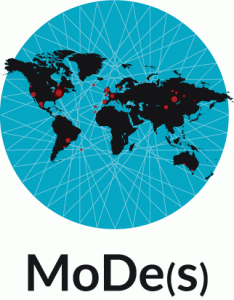Critical imaginaries and expanded semantic fields from the Cold War to contemporaneity (2nd edition)
Research Workshop MoDe(s) 2
18-19 July 2019
Universidad Complutense de Madrid
Facultad de Geografía e Historia
Seminario 21, 9th floor
This research workshop continues the workshop organized in July 2018, conceived as a space for work and dialogue among the members of the MoDe(s)2 project.
MoDe(s)2 seeks to deepen four axes of transversal analysis. They delve into the role that culture and art have had in the multiple conflicts and frictions for the configuration of a collective consciousness (class, gender, race) that marked the years of the Cold War. Along with the need to develop a critical and complex cartography of practices and discourses, this second stage proposes a transversal study that delves into the powerful role of art in the configuration of cultural, social (and political) imaginaries, its contacts with social movements, as well as the contradictory relations between art and institutional politics in a moment of continuous crisis and rapid social destructuring, in which art took an active position. For example, the disintegration of class culture through the socialization of consumption, the vindication of rights in terms of wages (and the consequent institutionalization of trade unions and left-wing parties) and the fragmentation of traditional life communities did not prevent, however, a displacement of social conflict towards subaltern sectors and groups that emerged in the geographical translation of the revolt (with its main focus on the processes of decolonization and anti-imperialist resistance in the so-called Third World, in which artistic practices assumed a belligerent role) as well as in the heart of capitalism (with the emergence of a series of subcultures that challenged not only the social division of labour, but also its belonging to a class culture in which the new generations and the migrant population did not recognise each other). At the same time as these transformations were consolidated, artistic practices and discourses were intertwined with these counter-cultural movements, which arose, to a large extent, from the cultural revitalization of Marxism. These movements and affinity groups will supply what will be called, in the nineties, the Politics of Identity (Butler, 1990), powerful instruments generated by alternative thoughts, which would end up being the replacement of the traditional Politics of Classes of the left.
The language of the workshop will be Spanish.
Program
Morning
10.00-10.30 > Introduction by Paula Barreiro López and María Ruido
Panel 1 – Imaginarios de descolonizadores y tercermundistas: agentes y agencias revolucionarias
Chair : Juan Albarrán
Participants: Paula Barreiro López, Jaime Vindel, María Ruido and María Íñigo.
10.30-11.00 > Jaime Vindel
11.00-11.30 > Paula Barreiro López
11.30-12.00 > Pause
12.00-12.30 > María Ruido
12.30-13.00 > María Íñigo
13.00-14.15 > Roundtable
14.15-15.30 > Lunch
Afternoon
Panel 2 – Imaginarios de la Guerra Fría cultural: instituciones y prácticas surgidas del nuevo orden mundial/colonial
Chair: Paula Barreiro López
Participants: Olga Fernández López, Lola Jiménez Blanco, Anita Orzes and Fabiana Serviddio
15.30-16.00 > Olga Fernández López
16.00-16.30 > Lola Jiménez Blanco
16.30-17.00 > Pause
17.00-17.30 > Anita Orzes
17.30-18.00 > Fabiana Serviddio
18.00-19.15 > Roundtable
Morning
Panel 3 Imaginarios contra-revolucionarios y neoliberales : sujetos y nuevas proyecciones de identidad colectiva.
Chair : Olga Fernández López
Participants: Juan Albarrán, Julián Díaz Sánchez, Giulia Lamoni and Juliane Debeusscher
10.00-10.30 > Juan Albarrán
10.30-11.00 > Giulia Lamoni
11.00-11.30 > Julián Díaz Sánchez
11.30-12.00 > Pause
12.00-12.30 > Juliane Debeusscher
12.30-13.45 > Roundtable
13.45-15.30 > Lunch
Afternoon
15.30-18.00 > Coordination, organization and distribution of tasks
Download the program
Research workshop organised within the framework of the research project MoDe(s)2 – Decentralised Modernity(ies): art, politics and counterculture in the transatlantic axis during the Cold War. HAR2017-82755-P. With the collaboration of Universidad Complutense de Madrid.
Direction and coordination: Paula Barreiro López and María Ruido.



